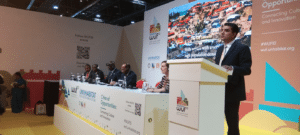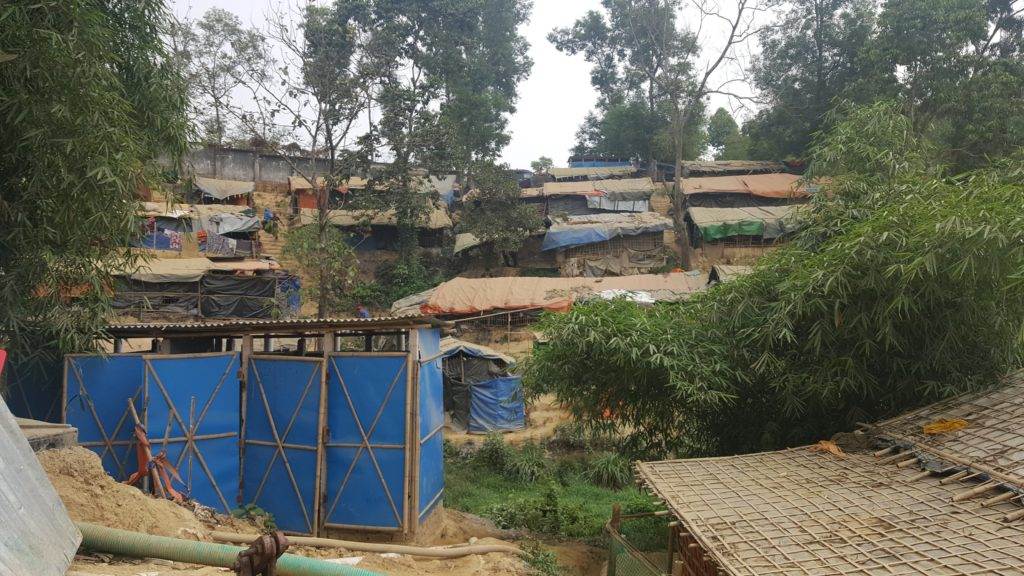Not expecting a huge turn-out, we had arranged coffee and cookies for 65 participants. We were really happy to share the snacks between 88 participants in the end.
This was a ‘networking event’ at the World Urban Forum, run by the UN agency dedicated to sustainable cities (UN-Habitat). It’s a huge conference that happens every two years, bringing together everyone from grassroots activists, to Government Ministers and the Heads of UN Agencies.

Mr. Hossain Ishrath Adib speaking at the World Urban Forum
Our event was one of 20 parallel discussions happening at the same time, but we drew a good crowd. Our topic was “Protecting environment, health, and delivering sustainable solutions for urban sanitation and integrated waste management”.
We were delighted to be here, demonstrating the real respect and partnership that exists between Practical Action and the Government of Bangladesh. The event was co-ordinated by the Urban Development Directorate, under the Ministry of Housing and Public Works. The Minister himself had encouraged us to put ourselves forwards to talk about our work in the Rohingya Refugee Camp at Cox’s Bazar.
Among many submissions from other NGOs, ours was the only one selected. Our task was to speak not only about our own work, but about the situation, and some of what others are also doing. We were really pleased to be entrusted with the task.
Mr. Hossain Ishrath Adib, Head of Programme Delivery, Practical Action in Bangladesh made the presentation. He described the challenge of such huge numbers arriving in a short space of time. The options for designs to help cope with the waste problems (both faecal sludge and household waste), are constrained by many factors including a lack of space, extreme weather events, steep slopes, and a prohibition on building permanent structures. But sometimes constraints lead to the best innovations, such as our decentralised sludge treatment plants.
A second objective was to share experience between countries. We were joined by the Ministry of Local Government and Rural Development, Ghana, and their local partner ZoomLion. Mr S M Rezaul Karim, the Minister of Housing and Public Works, Bangladesh, and Mr Kwasi Boateng Agyei, the Deputy Minister for Local Government, Ghana both made opening remarks and stayed for the whole session.
From Ghana, we heard about the ambitious partnership the Government has made with ZoomLion. This is a home-grown company, part of a family of 45 companies working in Ghana across a range of sectors. They are introducing waste management and treatment technologies initially in the capital Accra, but expanding to other towns too. Many of these are finding ways to generate value out of waste in the form of biogas, or briquettes, aiming to dramatically reduce the proportions of waste that remain untreated, and eventually find their way into the ocean.
We gained a global perspective from Mr Aujshushi Koresana, Head of Human Settlement at Asia Pacific Region, UN Habitat; Dr Lucy Stevens, Head of Urban Services for Practical Action; and Dr Kofi Boateng from Ghana.

Rohingya refugee camp
We all reflected on the value of sharing how these local solutions were being developed and deployed; and on the potential for these types of peer learning to bring new ideas in the future.
After any event like this, we ask ourselves ‘so what has been achieved?’ There are answers to this at different levels, and some may not be immediately apparent. However, we were able to show what can be achieved with limited resources and ingenious ideas, in very difficult circumstances, to improve the lives of Rohingya Refugees.
We strengthened important partnerships and hopefully inspired some new ones. The interest and intense conversations in the lobby afterwards with peer organisations, showed that people were both attentive and inspired.
Big change can start small when we have the opportunities to reflect on our work, share it with others and inspire new partnerships for the future. We think that was certainly the case with the environmentally friendly and sustainable solutions for sanitation and solid waste management we talked about today.